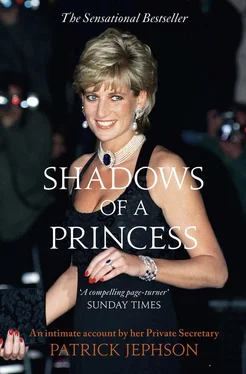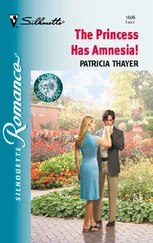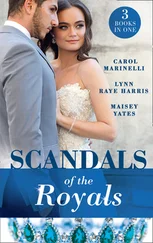‘Patrick, what d’you think of this hat?’
‘Um … very royal, Ma’am.’
‘Thanks. I’ll change it!’
The same process would operate in reverse in the evening, when she might ask me to pour a glass of champagne and join her in an irreverent postmortem on the people and issues that had made most impression on her over the course of the day.
This was quite nice, as far as it went. I defy anyone employed by royalty not to feel even a fleeting glow of illicit pleasure at being invited to share such intimacies. As I was to discover to my cost, however, centuries of deference had not been built up just to make the important people feel more important. Deference protected the small people too, from royal favour too lightly granted and too quickly withdrawn. So I was wary, even as I joined in what was, after all, just her way of dealing with the demands her job placed on her.
When she had chopped up and disposed of the day’s new players she often returned to a favourite subject: her husband. I once read extracts to her from Philip Ziegler’s biography of Edward VIII, in which the Prince of Wales (as he then was) was described by a contemporary as ‘part child, part genius’. She leapt at the comparison, as she did at many descriptions of her husband in which he appeared as naive, self-indulgent or emotionally immature.
In fairness, these were adjectives she was quite quick to direct at almost any member of the male species, and she was not blind to the Prince’s many virtues, among which she always included a touching vulnerability. When she spoke of him fondly – which admittedly was rare – it was with regret that he allowed his good intentions and good ideas (she stopped short of genius) to be hijacked by unscrupulous hangers-on. It was no surprise that many of her fiercest critics were drawn from these sycophantic ranks.
Even in the terminal stages of the marriage, when she was ready one minute to regard him as a wayward son and the next as her cold-blooded persecutor, I never knew her criticism of him to carry lasting malice. Nor do I doubt that she would have responded with pleasure and secret relief to marital peace overtures. For reasons that became clearer as my knowledge of them grew, however, the Waleses sadly found that they had less to contribute to their marriage than its survival demanded.
Meanwhile romance, in any of its forms, was what the Princess quite reasonably craved. She felt that it was withheld by her husband – deliberately or through incapacity – and therefore she sought and found it elsewhere.
Sometimes she found it in flirtatiousness at work, where her feminine charm was employed with precision and deadly effect. I was not immune to extravagant remarks such as ‘Oh Patrick, you’re the moon and stars to me!’ – even if the sentiment they implied did not seem to last very long.
Sometimes she found it in the supportive but necessarily circumscribed proximity of her personal staff. Any form of physical contact was, of course, unthinkable, but she would sometimes allow us all a playful frisson as we were invited to help her tie her army boots or check an evening gown’s dodgy zip.
With rare but spectacular exceptions, she was very cautious about expressing the aridity of her love life. Sometimes, though, the banter with which the painful subject was made bearable would slip, and in a voice suddenly sad and reflective, she would say, ‘Sex is OK, but sex with love is the best, isn’t it?’ That was quite a tough one to answer.
Although these sources of consolation were safe, they were no real substitute for the pleasures and hazards of a passionate relationship. Instead she developed an ability to experience emotions vicariously, drawing on her existing skills as a shrewd people-watcher and a natural talent to be sympathetic. St Paul’s injunction to rejoice with those who rejoice and weep with those who weep might have been written for her. Sadly, joy is not an easy emotion to experience at second hand and after an initial expression of pleasure at another’s good fortune, she often found that it left her feeling envious and dissatisfied. This always seemed to be most pronounced in maternity wards. It did not take a genius to work out why.
In addition, she did find some consolation in well-documented liaisons with other men, most notably with James Hewitt, who already rode high in her affections when I joined her staff. He was a regular but discreet visitor to KP, although our paths seldom crossed. Sometimes when I was leaving the red-haired Captain would be arriving, emitting a palpable sense of unease and a nervous but winning smile.
Later, the Princess closely involved me in her attempts – by then – to distance herself from him. I even carried discouraging messages to him at his barracks when he was planning a newspaper revelation about their relationship ‘to put the record straight’ (something, incidentally, which I have never thought possible on practically any subject). In 1989, however, the affair was just one more thing to be ignored, another sign of our unhappy times.
Had I wanted to, I could have found out more and sometimes did, especially over a beer with a detective. I knew, however, that it was more important to be able to deny convincingly knowledge of anything that my boss might later wish she had not done. Being a royal conscience might be a wonderfully self-justifying job, but it would be a short one.
She was paranoid that her affair would be discovered – but only because it would weaken her moral superiority over her husband. She only admitted the affair with Hewitt after it had become public knowledge. After his return from the Gulf War in 1991, the Princess often visited Hewitt at his family home in Devon. She was terrified of being found out and I even warned the police that they might have to lie to cover up for her. I was shocked to hear myself say it, but they just smiled indulgently.
She wistfully imagined a house in the country – an idyllic domestic life for them both, full of children, dogs and horses – but when he became too besotted, she was embarrassed and realized he was a liability in the battle against her husband for public sympathy.
Although I chose to be ignorant at the time, and naive too, it was sadly obvious even to me that these desperate, ill-starred affairs shared Jane Austen’s description of adultery as merely consuming the participants with ‘universal longing’. As I watched her struggle with this longing, but also with conscience, duty and an enduring loyalty to her husband, I sometimes found it hard not to recognize some truth in her generally low opinion of men.
More than once I heard her reproduce a favourite and very second-hand phrase, picked up from TV, I guessed, but no less sincere for that: ‘All men are bastards!’ Sometimes, catching a flicker of reaction on my face, she might add, ‘Sorry, Patrick.’
I began to watch closely how the Princess coped with the strains of her predicament. She was not good at relaxing, although she devoted increasing amounts of time and energy to finding the ‘peace of mind’ she often told me she was searching for. Her luggage was always well stocked with the latest in a seemingly endless catalogue of remedies – for stress, sleeplessness and various unspecified deficiencies, aches and pains. There were numerous varieties of homoeopathic pills, tinctures and oils, all accompanied by scrappy instructions which she would sometimes read aloud to me in search of guidance I could not give.
Aromatherapy was a continuing fascination, which was not surprising given her love of perfumes, flowers and scented candles. Keen to share her belief in its revitalizing qualities, she once gave me some expensively prepared bath oil. It was a kind gesture, even if it did make the bath – and me – smell of Harpic to my uneducated nose.
Читать дальше












